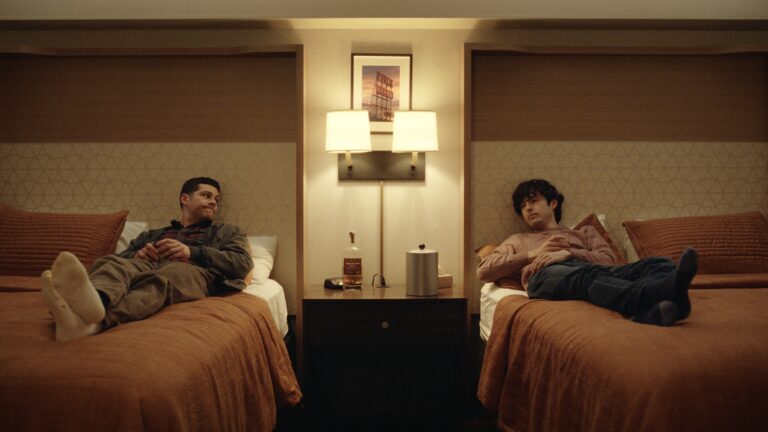Writer-director James Sweeney’s Twinless begins with an off-screen car accident and an abrupt cut to a funeral — a tonal whiplash moment that immediately sets the stage for a film that’s equal parts hilarious, unsettling, and surprisingly poignant. What initially seems like a simple indie dramedy about two grieving men forming an unlikely friendship quickly reveals itself to be something far more complex: a study of loneliness, masculinity, and emotional dependency wrapped in a darkly comedic package, with quite a bit of emphasis on “dark.”
Twinless follows Roman (Dylan O’Brien), an emotionally adrift “bro” of a guy whose twin brother has just died, and Denis (Sweeney), an awkward and guarded young man also mourning the loss of his own twin. The two meet in a bereavement support group and form a bond, with Roman frequently calling on Denis for company in mundane activities like grocery shopping. At first their dynamic is defined by the contrast of their seemingly mismatched personalities, but their connection deepens as they find solace in each other’s presence.
O’Brien delivers what is arguably his best performance to date, embodying Roman with a mix of dopey charm, barely contained rage, and an undercurrent of deep sorrow. His portrayal can be read as a subtle critique of traditional masculinity, presenting a man unable to express emotions except through misguided outbursts or childlike dependency. Sweeney, on the other hand, crafts Denis as someone teetering on the edge of loneliness and longing, and while his attraction to Roman is left ambiguous, Twinless smartly avoids falling into clichés about queer yearning. Instead, it satirizes and sympathizes with the ways in which people seek out emotional lifelines, even when the connection may feel incongruous.
Just when Twinless risks becoming a predictable odd-couple story, it pulls the rug out from under the audience. A late title card (nearly 30 minutes into the film) signals a drastic shift in perspective, revealing that Denis has been far more involved in shaping events than initially believed. While the details of this revelation are best left unspoiled, it’s a testament to Sweeney’s skill that the film never feels gimmicky; rather, the shift enriches the characters’ arcs, deepening our understanding of their actions and motivations.
Beyond its intricate storytelling, Twinless also engages in a fascinating dialogue about gender, grief, and emotional repression. Roman’s struggle to process loss without the built-in intimacy of his twin challenges the rigid norms of male emotional expression. Meanwhile, Denis’s journey examines the way gay men are often expected to navigate their desires within a heteronormative world. The film never preaches, instead trusting the audience to interpret its themes through the specificity of its characters. It’s a daring and deeply affecting work, not only cementing Sweeney as a filmmaker to watch, but also proving that O’Brien is capable of far more complexity and nuance than the teen genre roles which defined his early career.
Find more of our Sundance 2025 coverage at this link.

